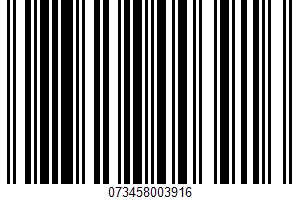Mini Round Cheese Ravioli - 218 calories
Manufacturer Angy's Landolfi Food Group, Llc
Product Information and Ingredients
Mini Round Cheese Ravioli is manufactured by Angy's Landolfi Food Group, Llc with a suggested serving size of 4 ONZ (114 g) and 218 calories per serving. The nutritional value of a suggested serving of mini round cheese ravioli includes 31 mg of cholesterol, 0 mg of sodium, 39 grams of carbohydrates, 1 grams of dietary fiber, 2 grams of sugar and 10 grams of proteins.
The product's manufacturer code is UPC: 073458003916.
Mini Round Cheese Ravioli is a low fat food because it contains less than 3 grams of fat per suggested serving.
Ingredient List
- Dough: Extra Fancy Durum Flour (durum Wheat Flour
- Niacin
- Ferrous Sulfate
- Thiamin Mononitrate
- Riboflavin
- Folic Acid)
- Water
- Eggs Filling: Ricotta Cheese (whey
- Milk
- Vinegar
- Salt)
- Water
- Imported Pecorino Romano Cheese (pasteurized Sheep's Milk
- Rennet
- Salt
- Cheese Cultures)
- Parmesan Cheese (pasteurized Milk
- Cheese Cultures
- Rennet
- Salt)
- Salt
- Pepper
- Parsley

Nutrition Facts
Serving Size 4 ONZ (114 g)
| Amount Per Serving | ||
|---|---|---|
| Calories 218 | Calories from Fat 27 | |
| % Daily Value* | ||
| Total Fat 3g | 5% | |
| Saturated Fat 1g | 6% | |
| Trans Fat 0g | ||
| Cholesterol 31mg | 12% | |
| Sodium 0mg | 0% | |
| Total Carbohydrate 39g | 15% | |
| Dietary Fiber 1g | 5% | |
| Sugars 2g | ||
| Protein 10g | ||
| Vitamin A 5% | Vitamin C 0% |
| Calcium 10% | Iron 2% |
* Percent Daily Values are based on a 2,000 calorie diet.
Nutrition Facts
Serving Size 100g (about 3.52 oz)
| Amount Per Serving | ||
|---|---|---|
| Calories 191 | Calories from Fat 24 | |
| % Daily Value* | ||
| Total Fat 2.6g | 5% | |
| Saturated Fat 0.9g | 5% | |
| Trans Fat 0g | ||
| Cholesterol 27mg | 10% | |
| Sodium 246mg | 12% | |
| Total Carbohydrate 34.2g | 13% | |
| Dietary Fiber 0.9g | 4% | |
| Sugars 2g | ||
| Protein 9g | ||
| Vitamin A 4% | Vitamin C 0% |
| Calcium 8% | Iron 2% |
* Percent Daily Values are based on a 2,000 calorie diet.
Mini Round Cheese Ravioli Nutritional Value
| Nutrient | Suggested Serving 4 ONZ (114 g) | Standard Serving 100g |
|---|---|---|
| Energy | 218 kcal (12%) | 191 kcal (11%) |
| Protein | 10 g (22%) | 8.77 g (20%) |
| Total Lipid (fat) | 3 g (5%) | 2.63 g (5%) |
| Carbohydrate, By Difference | 39 g (15%) | 34.21 g (13%) |
| Fiber, Total Dietary | 1 g (5%) | 0.9 g (4%) |
| Sugars, Total | 2 g (9%) | 1.75 g (8%) |
| Calcium, Ca | 109 mg (10%) | 96 mg (8%) |
| Iron, Fe | 0.36 mg (2%) | 0.32 mg (2%) |
| Sodium, Na | 280 mg (13%) | 246 mg (12%) |
| Vitamin C, Total Ascorbic Acid | 0 mg (0%) | 0 mg (0%) |
| Vitamin A, Iu | 200 IU (5%) | 175 IU (4%) |
| Fatty Acids, Total Saturated | 1 g (6%) | 0.88 g (5%) |
| Fatty Acids, Total Trans | 0 g (0%) | 0 g (0%) |
| Cholesterol | 31 mg (12%) | 27 mg (10%) |
Calories Burn off Time
How long would it take to burn off Angy's Landolfi Food Group, Llc Mini Round Cheese Ravioli with 218 calories? A brisk walk for 47 minutes, jogging for 22 minutes, or hiking for 36 minutes will help your burn off the calories in mini round cheese ravioli.
Burn off time varies based on your weight, physical activity and exercise intensity. The following physical activity table contains an estimated burn off time for a person weighting 154 lbs.
| Physical Activity | Burn Off Time |
|---|---|
| Bicycling - 10 mph or less | 45 minutes |
| Dancing | 40 minutes |
| Golfing | 40 minutes |
| Hiking | 36 minutes |
| Light Gardening | 40 minutes |
| Stretching | 73 minutes |
| Walking - 3.5 mph | 47 minutes |
| Weight Training - light workout | 61 minutes |
| Aerobics | 27 minutes |
| Basketball | 30 minutes |
| Bicycling - 10 mph or more | 22 minutes |
| Running - 5 mph | 22 minutes |
| Swimming | 26 minutes |
| Walking - 4.5 mph | 29 minutes |
| Weight Training - vigorous workout | 30 minutes |
Footnotes
Percent daily values are based on a 2,000 calorie reference diet. Factors like age, gender and level of physical activity may affect your daily required values.
The editorial opinions regarding food value or quality in this website are given without warranty, and are not intended to replace medical advice or a nutritionist guidance.
Dietary Recommendations
A healthy eating pattern that accounts for all foods and beverages within an appropriate calorie level could help achieve and maintain a healthy weight and reduce the risk of chronic disease. Healthy eating habits include the following:
- Vegetables from all subgroups, including dark, green, red and orange vegetables and also beans and peas
- A variety of whole fruits
- Grains with at least half of which are whole grains
- Low or fat free dairy products, including milk, yogurt, cheese and/or fortified soy beverages
- Protein foods, including seafood, lean meats and poultry, eggs and nuts
- Oils with limited amounts of saturated fats and trans fats, added sugars, and sodium
